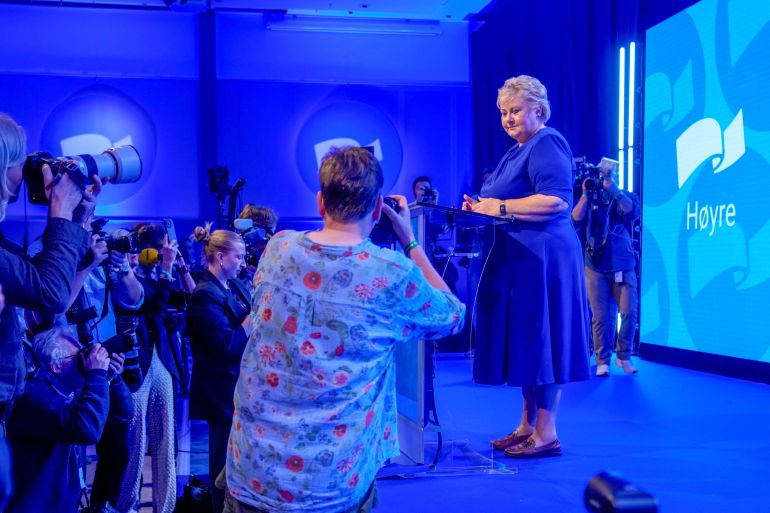Published On 8 Sep 2025
Norway’s Labour Prime Minister Jonas Gahr Stoere has claimed victory in Monday’s legislative elections, which also saw a record surge in support for the anti-immigration populist Progress Party.
“We did it,” the 65-year-old leader Stoere exclaimed at an election night rally after Labour came out on top, with about 28 percent of votes, which enabled him to remain in power with the support of four other left-wing parties.
Recommended Stories
list of 2 itemsend of list
Rapturous cheering erupted in Oslo on Monday night as Labour supporters gathered to celebrate a closely fought campaign in which the future of a wealth tax that dates to the late 19th century has been a central issue.
Addressing the crowd, Stoere thanked his supporters and said the victory showed that it was possible for Social Democratic parties to win elections, even with right-wing forces on the rise in Europe, according to the broadcaster VG.
The right-wing Progress Party saw its best result ever in a national election, coming in second place. Addressing supporters, Progress Party leader Sylvi Listhaug was pleased with her party’s result but lamented what she called “four tough years ahead for people and businesses”.
Conservative Party leader Erna Solberg apologised for the dismal performance of her party, which fell to third place in parliament.
Sovereign fund’s investment in Israel
About 4.3 million people in the Scandinavian nation were eligible to vote for the new 169-member parliament, or Storting. With almost all votes now counted, centre-left parties have won just more than the 85 seats needed to form a majority.
Final results are expected on Tuesday. They are likely to be followed by weeks of negotiations to build a coalition and agree on Cabinet positions before King Harald can swear in a new government.
Stoere’s second term in office comes after a fiercely contested election, surviving internal party strife, Cabinet scandals and an attempted leadership coup to cling to power.
His Labour Party has faced turbulent years, marked by soaring inflation, rising interest rates and a string of ministerial resignations over tax evasion, ethics breaches and undisclosed share trades.
The election campaign in Norway – a country of 5.6 million people and among the richest per capita in the world – has revolved around the cost of living, inequality, public services and how much citizens should pay in tax.
However, a debate over the country’s $2 trillion sovereign fund’s investments in Israel took centre stage at the beginning of the campaign. Since then, the fund has divested from at least 11 companies following media reports that it owned a stake in a jet engine company that provides maintenance for Israeli fighter jets.
The fund had divested from just two Israeli companies before that.
Norway’s wealth fund also divested from Caterpillar on ethics grounds over the use of the company’s products, bulldozers in particular, by Israeli authorities in Gaza and the Israeli-occupied West Bank.
Wealth tax
The wealth tax, in particular, has divided the political landscape. In recent years, dozens of wealthy Norwegians have relocated to Switzerland to escape it, sparking heated debate between the two main blocs over whether to scrap the levy.
Labour campaigned to retain the wealth tax, while the Conservatives wanted it reduced, and the Progress Party, which advocates for stricter immigration controls, wants it scrapped.
In early 2025, Stoere reshaped his cabinet to shore up his authority, naming former NATO Secretary-General and former Prime Minister Jens Stoltenberg as finance minister.
A longtime ally and personal friend, Stoltenberg’s return was widely seen as pivotal in stabilising Stoere’s leadership and boosting Labour’s international credibility.
The reshuffle also saw the rural-based Centre Party expelled from government, signalling a more streamlined Labour operation.
Economic pain, however, continues to haunt Stoere’s government. Inflation peaked at 7.5 percent in 2022 and interest rates reached levels not seen since 2008, though both have since eased, giving households some relief.
Despite his victory, Stoere faces a fragmented parliament. He will now rely on the support of four smaller left-leaning parties, making the task of governing far more complex.
